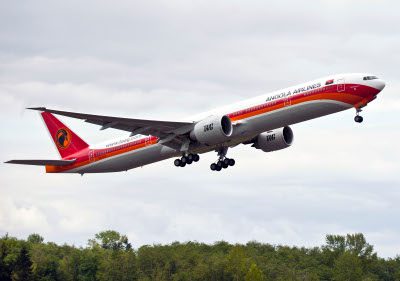
TAAG777 300ER
The pandemic created a lot of disruption to air travel and the entire industry supply chain. The industry continues trying to reset and recover. Evidence of this is news today from Luanda, Angola. Boeing and TAAG reach an agreement.

This is an example of how commercial aviation is a long-term play. The pandemic threw a wrench into everything. Many airlines collapsed or needed to be restructured. TAAG, as a state-owned enterprise had to be put through restructuring. But the path to this has been very bumpy. TAAG is symptomatic of many airlines but faced certain unique issues.
In 2016 there was talk about “corruption and economic vulnerability” at TAAG. In 2018 there was yet another round of TAAG corporate disruption. Then in 2020, yet another TAAG reset. The 2020 version was special as TAAG was under the control of the president’s daughter who had become the richest woman in Africa. Of course, nothing happening was her fault, she claimed. Her brother also had legal trouble. Ms. dos Santos now has US visa restrictions. The former president is now in exile.
Imagine Boeing having to go through this melange of political intrigue? The example of Angola is not unique. With states “needing” a flag carrier, OEMs have to trade with some unsavory people. In 2020, Airbus had to pay a fine to resolve foreign bribery charges. This isn’t a recent thing though. As this 2017 article explains. In 2015 The Volkov Law Group published an article explaining why commercial aviation is vulnerable to problems, “The corruption risks in the aviation industry are significant. Civil aviation is an industry with extensive government control of assets (e.g. airports) and regulation. In addition, foreign military contracts are very lucrative for private aviation companies. The industry itself includes former military officials with extensive and deep relationships with current foreign military officials. As a result, the risks for large and small companies in the aviation industry are real and significant.”
Recommended reading on this matter also comes from Baker Hostetler. As they note: “…companies working in the aerospace industry are at special risk. This special risk is created by two main factors inherent in the industry – a high percentage of government-owned or -controlled airlines and the prominent use of third parties in countries with high risk of corruption, payments to which are prohibited if all or a part of that payment would be passed on to a foreign official. This special risk is not limited to airplane manufacturers but also exists in the repair and supply sector of the aerospace industry. In fact, no other industry has been the subject of more scrutiny“. This part of the industry isn’t discussed often, as you might imagine.
To come back to today’s TAAG/Boeing news, a public statement reflects an attempt at transparency. This is excellent for both companies. Boeing, as a US corporation, operates in an environment that has several laws to ensure open and fair trading. It is especially heartening therefore to see the news come from Angola. TAAG’s new management is working diligently to recover from the past unsettled history. If the state can stay out of the way, they are probably going to succeed. The new team includes old industry hands.
Views: 1





Since when did Isabel control TAAG? She was already in exile by 2020 and was closing her businesses down in Portugal and Angola as asset freezes started to bite following Luanda Leaks and JLo’s ‘attacks’ on her and the rest of the dos Santos clan. TAAG is a terribly inefficient business, plagued by corruption and a national pride, so of all large businesses in Angola, it would be way down her list of businesses she would want to run.